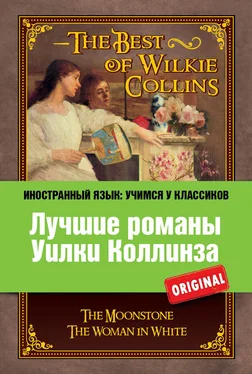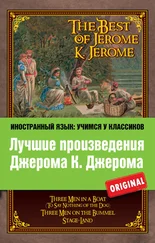“So far as your own convictions are concerned, I am certain you have spoken the truth,” he replied. “I have the highest esteem for Miss Halcombe, and I have therefore every reason to respect a gentleman whose mediation she trusts in a matter of this kind. I will even go farther, if you like, and admit, for courtesy’s sake and for argument’s sake, that the identity of Lady Glyde as a living person is a proved fact to Miss Halcombe and yourself. But you come to me for a legal opinion. As a lawyer, and as a lawyer only, it is my duty to tell you, Mr. Hartright, that you have not the shadow of a case.”
“You put it strongly, Mr. Kyrle.”
“I will try to put it plainly as well. The evidence of Lady Glyde’s death is, on the face of it, clear and satisfactory. There is her aunt’s testimony to prove that she came to Count Fosco’s house, that she fell ill, and that she died. There is the testimony of the medical certificate to prove the death, and to show that it took place under natural circumstances. There is the fact of the funeral at Limmeridge, and there is the assertion of the inscription on the tomb. That is the case you want to overthrow. What evidence have you to support the declaration on your side that the person who died and was buried was not Lady Glyde? Let us run through the main points of your statement and see what they are worth. Miss Halcombe goes to a certain private Asylum, and there sees a certain female patient. It is known that a woman named Anne Catherick, and bearing an extraordinary personal resemblance to Lady Glyde, escaped from the Asylum; it is known that the person received there last July was received as Anne Catherick brought back; it is known that the gentleman who brought her back warned Mr. Fairlie that it was part of her insanity to be bent on personating his dead niece; and it is known that she did repeatedly declare herself in the Asylum (where no one believed her) to be Lady Glyde. These are all facts. What have you to set against them? Miss Halcombe’s recognition of the woman, which recognition after-events invalidate or contradict. Does Miss Halcombe assert her supposed sister’s identity to the owner of the Asylum, and take legal means for rescuing her? No, she secretly bribes a nurse to let her escape. When the patient has been released in this doubtful manner, and is taken to Mr. Fairlie, does he recognise her? Is he staggered for one instant in his belief of his niece’s death? No. Do the servants recognise her? No. Is she kept in the neighbourhood to assert her own identity, and to stand the test of further proceedings? No, she is privately taken to London. In the meantime you have recognised her also, but you are not a relative – you are not even an old friend of the family. The servants contradict you, and Mr. Fairlie contradicts Miss Halcombe, and the supposed Lady Glyde contradicts herself. She declares she passed the night in London at a certain house. Your own evidence shows that she has never been near that house, and your own admission is that her condition of mind prevents you from producing her anywhere to submit to investigation, and to speak for herself. I pass over minor points of evidence on both sides to save time, and I ask you, if this case were to go now into a court of law – to go before a jury, bound to take facts as they reasonably appear – where are your proofs?”
I was obliged to wait and collect myself before I could answer him. It was the first time the story of Laura and the story of Marian had been presented to me from a stranger’s point of view – the first time the terrible obstacles that lay across our path had been made to show themselves in their true character.
“There can be no doubt,” I said, “that the facts, as you have stated them, appear to tell against us, but – ”
“But you think those facts can be explained away,” interposed Mr. Kyrle. “Let me tell you the result of my experience on that point. When an English jury has to choose between a plain fact ON the surface and a long explanation UNDER the surface, it always takes the fact in preference to the explanation. For example, Lady Glyde (I call the lady you represent by that name for argument’s sake) declares she has slept at a certain house, and it is proved that she has not slept at that house. You explain this circumstance by entering into the state of her mind, and deducing from it a metaphysical [250]conclusion. I don’t say the conclusion is wrong – I only say that the jury will take the fact of her contradicting herself in preference to any reason for the contradiction that you can offer.”
“But is it not possible,” I urged, “by dint of patience and exertion, to discover additional evidence? Miss Halcombe and I have a few hundred pounds – ”
He looked at me with a half-suppressed pity, and shook his head.
“Consider the subject, Mr. Hartright, from your own point of view,” he said. “If you are right about Sir Percival Glyde and Count Fosco (which I don’t admit, mind), every imaginable difficulty would be thrown in the way of your getting fresh evidence. Every obstacle of litigation would be raised – every point in the case would be systematically contested – and by the time we had spent our thousands instead of our hundreds, the final result would, in all probability, be against us. Questions of identity, where instances of personal resemblance are concerned, are, in themselves, the hardest of all questions to settle – the hardest, even when they are free from the complications which beset the case we are now discussing. I really see no prospect of throwing any light whatever on this extraordinary affair. Even if the person buried in Limmeridge churchyard be not Lady Glyde, she was, in life, on your own showing, so like her, that we should gain nothing, if we applied for the necessary authority to have the body exhumed. In short, there is no case, Mr. Hartright – there is really no case.”
I was determined to believe that there WAS a case, and in that determination shifted my ground, and appealed to him once more.
“Are there not other proofs that we might produce besides the proof of identity?” I asked.
“Not as you are situated,” he replied. “The simplest and surest of all proofs, the proof by comparison of dates, is, as I understand, altogether out of your reach. If you could show a discrepancy between the date of the doctor’s certificate and the date of Lady Glyde’s journey to London, the matter would wear a totally different aspect, and I should be the first to say, Let us go on.”
“That date may yet be recovered, Mr. Kyrle.”
“On the day when it is recovered, Mr. Hartright, you will have a case. If you have any prospect, at this moment, of getting at it – tell me, and we shall see if I can advise you.”
I considered. The housekeeper could not help us – Laura could not help us – Marian could not help us. In all probability, the only persons in existence who knew the date were Sir Percival and the Count.
“I can think of no means of ascertaining the date at present,” I said, “because I can think of no persons who are sure to know it, but Count Fosco and Sir Percival Glyde.”
Mr. Kyrle’s calmly attentive face relaxed, for the first time, into a smile.
“With your opinion of the conduct of those two gentlemen,” he said, “you don’t expect help in that quarter, I presume? If they have combined to gain large sums of money by a conspiracy, they are not likely to confess it, at any rate.”
“They may be forced to confess it, Mr. Kyrle.”
“By whom?”
“By me.”
We both rose. He looked me attentively in the face with more appearance of interest than he had shown yet. I could see that I had perplexed him a little.
“You are very determined,” he said. “You have, no doubt, a personal motive for proceeding, into which it is not my business to inquire. If a case can be produced in the future, I can only say, my best assistance is at your service. At the same time I must warn you, as the money question always enters into the law question, that I see little hope, even if you ultimately established the fact of Lady Glyde’s being alive, of recovering her fortune. The foreigner would probably leave the country before proceedings were commenced, and Sir Percival’s embarrassments are numerous enough and pressing enough to transfer almost any sum of money he may possess from himself to his creditors. You are of course aware – ”
Читать дальше
Конец ознакомительного отрывка
Купить книгу












